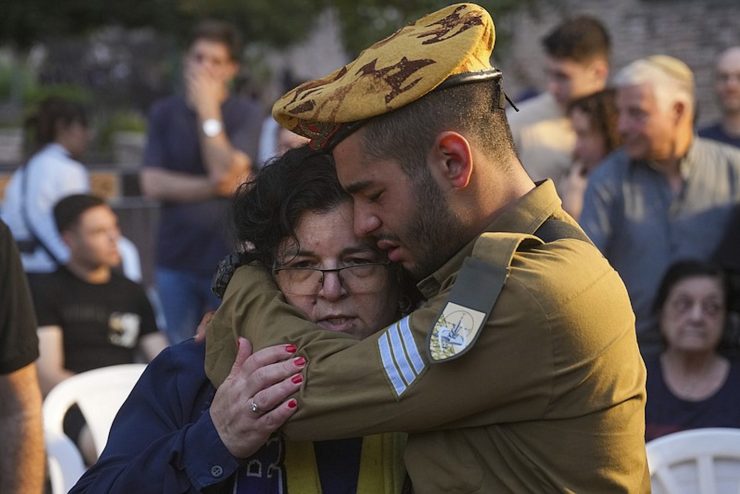From Bishop Budde and Dean Hollerith: Tears for the Holy Land
This violence grieves the very heart of God, and God weeps for the people of Israel. The blood that now soaks the sacred ground of the Holy Land gives root to little more than the seeds of bitterness, hatred and retribution.

Two years ago this week, this Cathedral dedicated a stone carving of Holocaust survivor and Nobel Peace Prize laureate Elie Wiesel, a faithful Jew and a stalwart defender of Israel. During the dedication service, his only son, Elisha, addressed his late father.
“You taught us that language matters, and truth matters,” he said to his father. “But we have grown lazy with language, and lazy with the truth.”
Elie Wiesel warned us against the allure of indifference, and he urged vigilance against the idea that somebody else’s suffering is somebody else’s problem to solve.
Let us be as clear as we can be: the execution of Israelis and others at the hands of Hamas terrorists is abhorrent, and we grieve with everyone in Israel who is suffering from this violent attack. In this moment when Israel endures the largest slaughter of Jews since the Holocaust, we must not be lazy about this truth.
This is a moment when we must say, without equivocation, that the senseless targeting of innocent civilians is always and everywhere wrong.
The capture and rape of civilian hostages, the slaughter of parents and children, the wanton and unprovoked carnage unleashed against the citizens of Israel is evil, and we must condemn it.
This violence grieves the very heart of God, and God weeps for the people of Israel. The blood that now soaks the sacred ground of the Holy Land gives root to little more than the seeds of bitterness, hatred and retribution.
It is equally true that God’s heart breaks for the suffering people of Gaza. The vast majority of Palestinians living in Gaza are not terrorists, and half are children who have known nothing but war for their entire lives. Israel’s response must protect the innocent. Even as terrorists purposefully target civilians, democracies must yield to the humanitarian mandate to protect the innocent and the most vulnerable.
Some things are true on one side of the border as they are on the other: There is no justification – none – for taking hostages or targeting innocents. We are called to stand for the protection of all non-combatants, and we pray for the hostages in the darkness of their fear.
As Christians, we hear the voice of Jesus, who came among us as the Prince of Peace. “Blessed are the merciful,” he said, “for they will receive mercy. … Blessed are the peacemakers, for they will be called children of God.” We stand with our brother, Archbishop Hosam Naoum of the Episcopal Diocese of Jerusalem and the Middle East, and we join in his fervent prayer that God will “be present for all who suffer, for people of all faiths–Jews, Christian, and Muslim–and for all people of the land.”
In accepting his Nobel Peace Prize in 1986, Elie Wiesel challenged the world to turn our eyes to the places most in pain. And today, we cast our eyes and direct our prayers to the tear-soaked Holy Land.
“When human lives are endangered, when human dignity is in jeopardy … wherever men and women are persecuted because of their race, religion, or political views,” he reminds us, “that place must – at that moment – become the center of the universe.”
Lord, in your mercy, hear our prayer.
The Right Rev. Mariann Edgar Budde, Bishop of the Episcopal Diocese of Washington
The Very Rev. Randolph Marshall Hollerith, Dean of Washington National Cathedral
(photo courtesy The Associated Press)